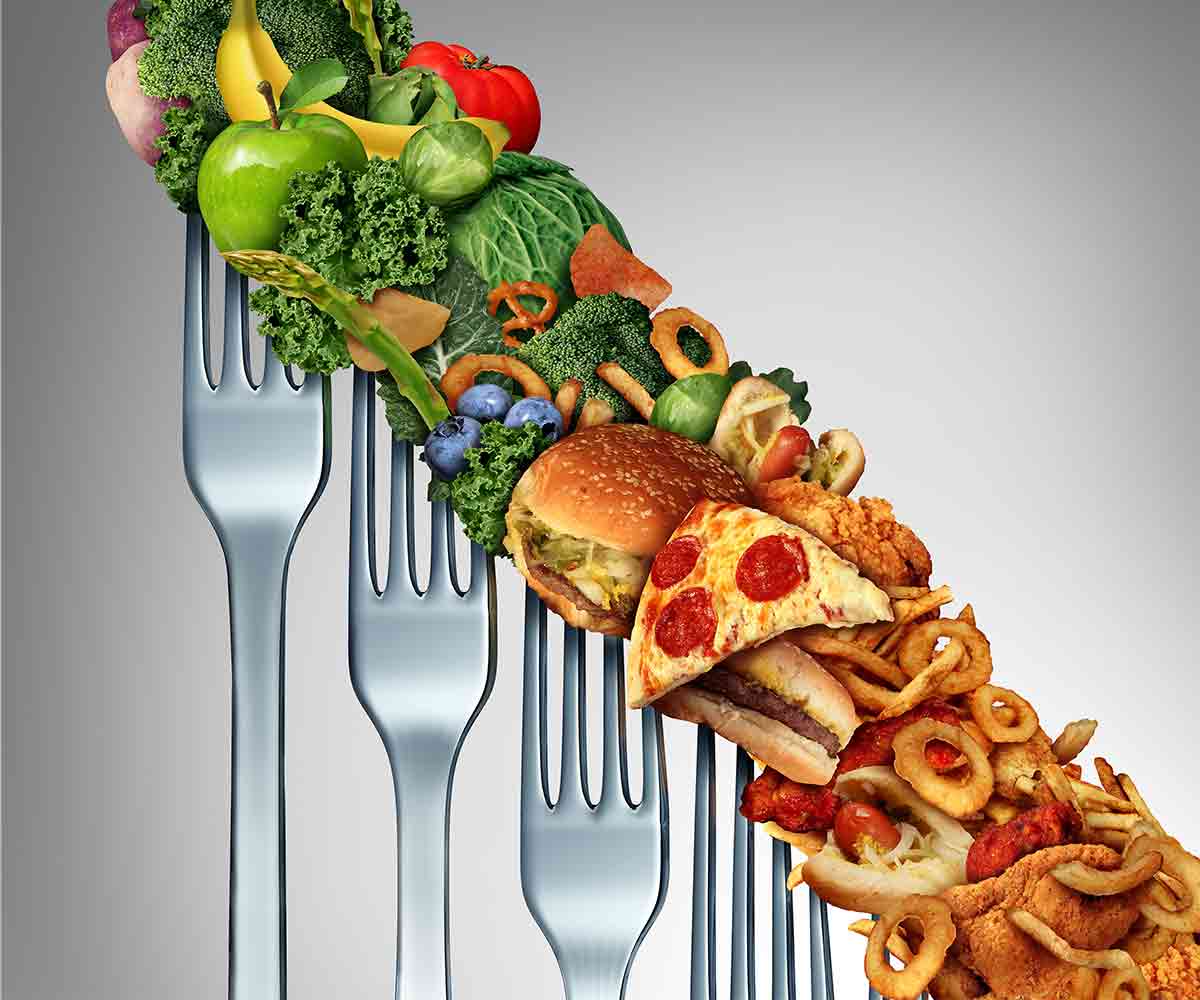Over 25 million people in the United States have diabetes, and diabetes takes an enormous toll on the health of our population.1 Diabetes accelerates aging; damaging the kidneys, cardiovascular system, eyes and nerve tissue, and increases cancer risk.2-4
The devastating complications and premature deaths associated with diabetes can be prevented. The primary cause of the parallel increases in obesity and diabetes is the nutrient-depleted American diet. The worst foods for diabetes – the foods that elevate blood sugar, reduce insulin sensitivity and increase Type 2 diabetes risk – are the foods that are most common in the standard American diet.
Added Sugars
Since diabetes is characterized by abnormally elevated blood glucose levels, of course, it is wise to avoid the foods that cause dangerously high spikes in blood glucose – primarily refined foods such as sugar-sweetened beverages, devoid of fiber to slow the absorption of glucose into the blood. Fruit juices and sugary processed foods and desserts have similar effects. These foods promote hyperglycemia and insulin resistance, and promote the formation of advanced glycation end products (AGEs) in the body: AGEs alter the normal, healthy function of cellular proteins, stiffen the blood vessels, accelerate aging, and promote diabetes complications.5,6
Refined Grains (White Rice and White Flour Products)
Refined carbohydrates like white rice, white pasta, and white bread are missing the fiber from the original grain, so they raise blood glucose higher and faster than their intact, unprocessed counterparts. In a six-year study of 65,000 women, those with diets high in refined carbohydrates from white bread, white rice, and pasta were 2.5 times as likely to be diagnosed with Type 2 diabetes compared to those who ate lower-GL foods such as intact whole grains and whole wheat bread.7 An analysis of four prospective studies on white rice consumption and diabetes found that each daily serving of white rice increased the risk of diabetes by 11 percent.8 In addition to the glucose-raising effects, cooked starchy foods also contain AGEs, which promote aging and diabetes complications.9,10
Fried Foods
Potato chips, French fries, doughnuts and other fried starches start with a high-glycemic food, and then pile on a huge number of low-nutrient calories in the form of oil. Plus, like other cooked starches, fried foods contain AGEs. 9,10
Trans Fats (Margarine, Shortening, Fast Food, Processed Baked Goods)
Diabetes accelerates cardiovascular disease; because the vast majority of diabetics (more than 80 percent1) die from cardiovascular disease, any food that increases cardiovascular risk will be especially problematic for those with diabetes. Trans fat intake is a strong dietary risk factor for heart disease; even a small amount of trans fat intake increases risk.11,12
In addition to their cardiovascular effects, saturated and trans fats reduce insulin sensitivity, leading to elevated glucose and insulin levels, and greater risk of diabetes.13
Red and Processed Meats
Many diabetics have come to believe that if sugar and refined grains and other high-glycemic foods raise blood sugar and triglycerides, they should avoid them and eat more animal protein to keep their blood glucose levels in check. However, several studies have now confirmed that a high intake of meat increases the risk of diabetes. A meta-analysis of 12 studies concluded that high total meat intake increased Type 2 diabetes risk 17 percent above low intake, high red meat intake increased risk 21 percent, and high processed meat intake increased risk 41 percent.14
Whole Eggs
Eating 5 eggs/week or more has been associated with an increased risk of developing Type 2 diabetes.15 When it comes to heart disease, eggs have been a controversial topic. However, for those with diabetes, the research is not controversial; there are clear links in many observational studies to large increases in risk. Large prospective studies such as The Nurses’ Health Study, Health Professionals Follow-up Study, and Physicians’ Health Study reported that diabetics who eat more than one egg/day double their cardiovascular disease or death risk compared to diabetics that ate less than one egg per week.16,17Another study of diabetics reported that those eating one egg/day or more had a five-fold increase in risk of death from cardiovascular disease.18,19
If you want to avoid diabetes and enhance your life expectancy, steer clear of these five foods and adopt a high-nutrient diet, which has been shown to reduce HbA1c into the non-diabetic range, reduce or eliminate the need for medications and dramatically improve blood pressure and triglycerides in diabetic patients.20 Read about the five best foods for diabetes here, and learn more in my book The End of Diabetes. If you know of anyone with diabetes – Type 1, Type 2 or pre-diabetes – it is absolutely essential they read this book; it could save their life.
- American Diabetes Association: Diabetes statistics [http://www.diabetes.org/diabetes-basics/statistics/]
- Campbell PT, Deka A, Jacobs EJ, et al. Prospective study reveals associations between colorectal cancer and type 2 diabetes mellitus or insulin use in men. Gastroenterology 2010, 139:1138-1146.
- Flood A, Strayer L, Schairer C, Schatzkin A. Diabetes and risk of incident colorectal cancer in a prospective cohort of women. Cancer Causes Control 2010, 21:1277-1284.
- He J, Stram DO, Kolonel LN, et al. The association of diabetes with colorectal cancer risk: the Multiethnic Cohort. Br J Cancer 2010, 103:120-126.
- Yamagishi S. Role of advanced glycation end products (AGEs) and receptor for AGEs (RAGE) in vascular damage in diabetes. Exp Gerontol 2011, 46:217-224.
- Barlovic DP, Thomas MC, Jandeleit-Dahm K. Cardiovascular disease: what’s all the AGE/RAGE about? Cardiovasc Hematol Disord Drug Targets 2010, 10:7-15.
- Salmeron J, Manson JE, Stampfer MJ, et al. Dietary fiber, glycemic load, and risk of non-insulin-dependent diabetes mellitus in women. JAMA 1997, 277:472-477.
- Hu EA, Pan A, Malik V, Sun Q. White rice consumption and risk of type 2 diabetes: meta-analysis and systematic review. BMJ 2012, 344:e1454.
- Goldberg T, Cai W, Peppa M, et al. Advanced glycoxidation end products in commonly consumed foods. J Am Diet Assoc 2004, 104:1287-1291.
- Pruser KN, Flynn NE. Acrylamide in health and disease. Front Biosci (Schol Ed) 2011, 3:41-51.
- Teegala SM, Willett WC, Mozaffarian D. Consumption and health effects of trans fatty acids: a review. J AOAC Int 2009, 92:1250-1257.
- Micha R, Mozaffarian D. Trans fatty acids: effects on metabolic syndrome, heart disease and diabetes. Nat Rev Endocrinol 2009, 5:335-344.
- Riserus U, Willett WC, Hu FB. Dietary fats and prevention of type 2 diabetes. Prog Lipid Res 2009, 48:44-51.
- Aune D, Ursin G, Veierod MB. Meat consumption and the risk of type 2 diabetes: a systematic review and meta-analysis of cohort studies. Diabetologia 2009, 52:2277-2287.
- Djousse L, Gaziano JM, Buring JE, Lee IM. Egg consumption and risk of type 2 diabetes in men and women. Diabetes Care 2009, 32:295-300.
- Qureshi AI, Suri FK, Ahmed S, et al. Regular egg consumption does not increase the risk of stroke and cardiovascular diseases. Med Sci Monit 2007, 13:CR1-8.
- Hu FB, Stampfer MJ, Rimm EB, et al. A prospective study of egg consumption and risk of cardiovascular disease in men and women. JAMA 1999, 281:1387-1394.
- Trichopoulou A, Psaltopoulou T, Orfanos P, Trichopoulos D. Diet and physical activity in relation to overall mortality amongst adult diabetics in a general population cohort. J Intern Med 2006, 259:583-591.
- Djousse L, Gaziano JM. Egg consumption in relation to cardiovascular disease and mortality: the Physicians’ Health Study. Am J Clin Nutr 2008, 87:964-969.
- Dunaief DM, Fuhrman J, Dunaief JL, Ying G. Glycemic and cardiovascular parameters improved in type 2 diabetes with the high nutrient density (HND) diet. Open Journal of Preventive Medicine 2012, 2.
Joel Fuhrman, M.D. is a family physician, New York Times best-selling author and nutritional researcher who specializes in preventing and reversing disease through nutritional and natural methods. Dr. Fuhrman is an internationally recognized expert on nutrition and natural healing, and has appeared on hundreds of radio and television shows including The Dr. Oz show, The Today Show, Good Morning America, and Live with Kelly. Dr. Fuhrman’s own hugely successful PBS television shows, 3 Steps to Incredible Health and Dr. Fuhrman’s Immunity Solution bring nutritional science to homes all across America.




